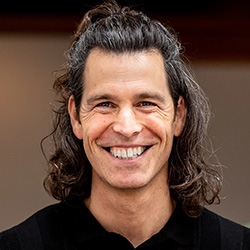

Search Results: experiencing
-
Among NVC practitioners, empathy can be superficial. How open are you to being influenced by what others are saying? Do you reflect back and then guard and remain within your position of being right, even as you say otherwise? Only when we're eager to be influenced by what they say can we connect, expand our world and thus, shift the field. Without such openness we fool ourselves into thinking we are truly empathic listeners.
-
- Find your voice in response to words you hear as racist
- Build bridges across significant differences of opinion
- Become a powerful ally for the racial justice movement
-
- Learn how to use empathy to dissolve conflict
- Deepen your NVC skills to help let go of judgments
- Explore approaches for asking for what you want
- Listen to the conflict within yourself
-
- Explore the spiritual foundations of NVC
- Witness transformational and healing processes led by Robert Gonzales
- Learn from the questions proposed by participants
- Gain processes that support a consciousness of the “Beauty of Needs”
-
"Falling out of love" is a misleading concept that can lead to feelings of helplessness in relationships. The initial intense phase of love gradually gives way to the need for intentional effort and communication. Unrealistic relationship expectations can erode connection, causing the perception of falling out of love. To address this, we can ask key questions and seek clarity to attend to unmet needs and maintain a healthy connection.
-
It is the first day of 2024 and I am filled with gratitude and awe. Yesterday, I celebrated my 9th year of hosting my annual New Year’s Peace Meditation. We had over 800 people register from many, many different countries and the meditation was interpreted into 4 different languages. It was incredibly moving, connecting, and hopeful for me!
-
Roxy Manning suggests that in navigating a situation where accusations of racism and a white savior complex arise, the facilitator emphasizes the distinction between intention and impact. Acknowledging the pain of the aggrieved person, the facilitator clarifies that racism is about impact, not necessarily intention. Encouraging a focus on the impact first, the facilitator invites understanding of the internal and systemic levels of the experience. Despite the person's insistence on their intention, the facilitator remains firm in prioritizing the discussion of impact. The goal is to create a space for acknowledging and addressing the impact before delving into intentions.
-
In this snippet from Duke Duchscherer's course, Restorative Dialogues: Transforming Conflict, Building Community Resilience, he shares a structured approach for conflict resolution or communication facilitation. It involves a facilitator guiding a conversation between two parties in conflict. The process begins with one party expressing their perspective while the other listens actively. The facilitator then prompts the listener to paraphrase what they heard, ensuring mutual understanding. This cycle continues until both parties feel heard. Subsequently, the facilitator encourages them to discuss potential solutions collaboratively. Once both sides are satisfied, the session concludes, with participants potentially swapping roles for further practice. The aim is for everyone involved to gain experience in effective communication and conflict resolution.
-
If you answer yes to at least one of the questions below, then this course may be key to building the relationship you want with your children:
- Do you know in your bones that you want to build a relationship in which both your needs and those of your children are fully included?
- Are you tired of seeing yourself time and again using methods to get your children to "cooperate" that you don't actually subscribe to?
- Do you struggle to imagine how to find enough hours in the day to collaborate for real with your children?
- Do you brace for any conversation with extended family and community who criticize you for being too soft with your children?
- Do you often feel all alone and wonder if you are actually on the right path?
-
“The Embodied Spirituality of Nonviolent Communication” is an introduction to NVC created from recordings of trainings Robert Gonzales offered in Hawaii in 2007 on the islands of Maui and Kauai.
This collection is a celebration of Robert's life and one way we can honor his outstanding work.
The original product was a set of DVDs. NVC Academy has converted the original 3 DVD set into 5 mp4 videos. We have taken care to preserve the original product while simultaneously upgrading to HD video and remastering the audio in this new mp4 format.
-
Have you ever noticed how being heard in a deep, empathic way is like magic?
When we're deeply heard, our whole bodies relax. We return to equilibrium, we can breathe again, and access renewed curiosity, empowerment and choice. We also get a fresh perspective and new insights: like a fog lifting, we see ideas and solutions that evaded us before. And with that restored vision, we're able to find new ways to engage with others that, just moments earlier, seemed impossible or a chore.
You can become an empathy wizard—with anyone, in any situation, including the most challenging!
Join Dian Killian to explore key concepts and practices, including new ways of seeing and practicing NVC, and learn all this through direct experience, via exercises, pair work, and role play.
-
If you’ve ever dreaded attending a meeting – or watched in dismay as your group collapses into conflict – know that a methodology known as Convergent Facilitation offers you possible solutions.
It’s based on one simple experience: that people come together at the level of their underlying principles, needs, aspirations, and dreams, not at the level of their surface positions.
Convergent Facilitation is a highly efficient decision-making process developed by Miki Kashtan from the principles of Nonviolent Communication. It enables you to look beneath the surface and find the essence of what’s important to different stakeholders, and bring it together into one set of principles that lead to proposals and ultimately decisions. As a result, it readily produces solutions and decisions that everyone can embrace.
-
Dear friends,
My book, Peaceful Living: Daily Meditations for Living with Love, Healing and Compassion has been on my mind a lot lately. It turns 20 years old next year, which I feel joyful about. Along the way, I came across this meditation that I wanted to share with you:
November 26
Change your thoughts and you change your world. – Norman Vincent PealeDeveloping Tolerance
I used to think that Chihuahuas were dumb dogs and bulldogs were ugly. Then one of my friends bought a longhaired Chihuahua named Tilly and another bought an English bulldog named Emma. Once I got to know these dogs and could see how truly sweet they are, it didn’t take long for me to fall in love with both of them.
-
Discover how to transform your life by aligning your actions with what matters most to you. In David Weinstock's 4-session course, you'll learn essential skills like managing moods, making values-driven decisions, and building stronger relationships using NVC and somatic techniques. Whether you're new to NVC or an experienced practitioner, these simple yet powerful practices will help you bridge divides, release anxiety, and live with grounded compassion.
-
- Understand the dynamics of power struggles
- Explore practical strategies for navigating power imbalances
- Discover ways you can share power in various relationships
- Explore how NVC supports a move away from domination, into shared power
-
Iris Bawidamann explains how needs, like appreciation, can easily turn into demands or self-blame when approached from a place of lack or expectation. This practice is based on the work of Living Compassion, shared by Robert Gonzales, focusing on the beauty of needs and the living energy of needs
-
In times of conflict, it’s easy to lose touch with ourselves and our needs. In this heartfelt session, Jesse Wiens Chu shares three practical centering practices—rooted in the principles of Nonviolent Communication (NVC)—to help you find your way back to self-connection, empathy, and choice.
-
When working to repair a relationship after conflict, and after reaching mutual care and understanding, you’re more likely to prevent future disconnection in similar situations by coming to clear, specific, and actionable agreements. Ensure requests for agreements come from a negotiable needs-based dialogue. Clarify specifics and plan to revisit agreements to assess their effectiveness.
-
Dear friends,
This morning, I woke up thinking about a poignant moment from a few years ago. My wife, Kim, and I were driving down a busy 4-lane road, and we were in a hurry to get somewhere important. Then we saw a mama duck with many small ducklings trying to get across the street. Kim pulled over, and we both hopped out to stop 4 lanes of traffic so Mama Duck could get across with all her ducklings. The last one had some kind of injury, so it took a very, very long time for all of them to make it across.
-
Miki Kashtan explores how to respond to group conflict wisely when you’re not directly involved.

Quick Links
Subscription Preferences
Stay In Touch!
Looking for ways to keep up with NVC Academy news, get special offers, free resources, or words of inspiration? Here are five ways to stay engaged:



















